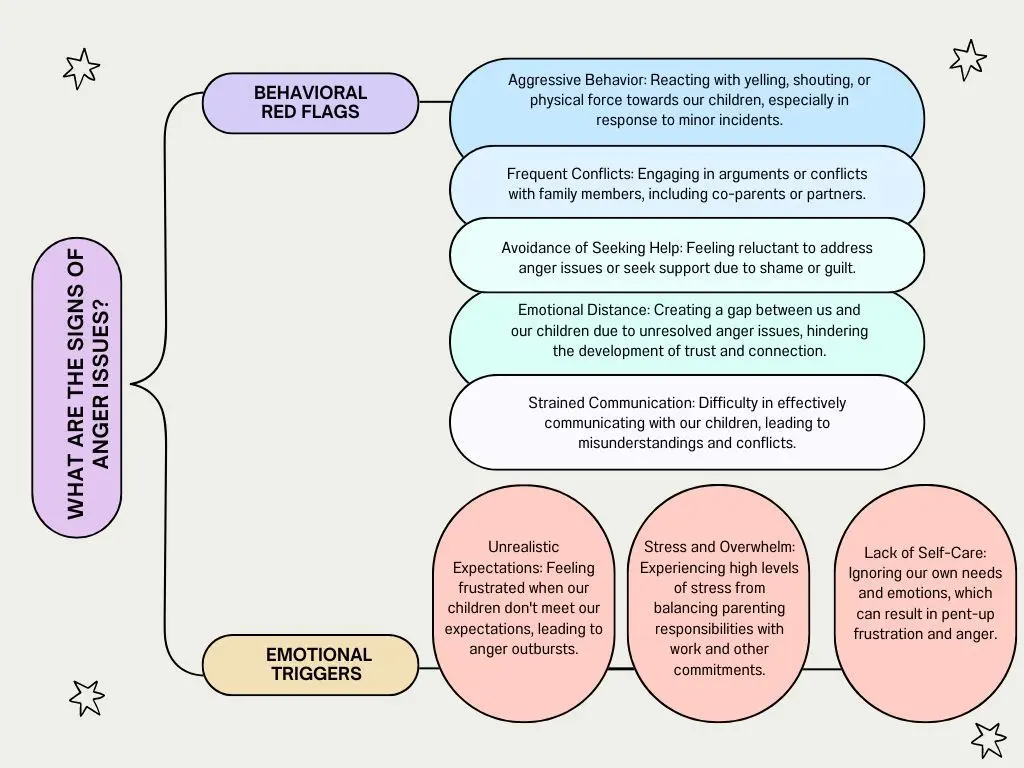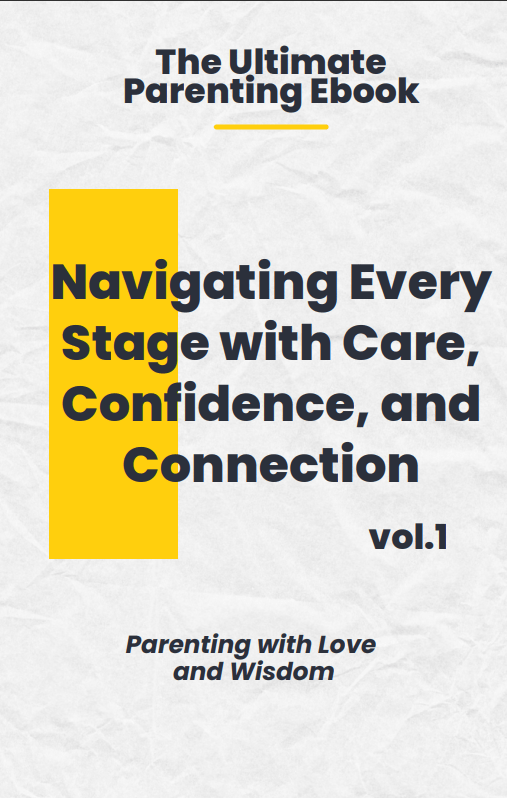Discover expert tips for parents with anger issues! Learn to manage triggers, foster healthier relationships, and create a harmonious home environment.

Being a parent presents a unique blend of fulfillment and difficulty. However, parents with anger issues face unique hurdles in maintaining a nurturing and positive home environment. According to the American Psychological Association (2023), approximately 40% of parents experience significant stress that can escalate into anger. It’s crucial to recognize and address these anger issues promptly to prevent emotional harm to children and foster healthy family dynamics. This blog will delve into nine effective strategies that parents can employ to manage their anger and create a calmer, happier home.
In This Blog
ToggleWhat are the Roots of Anger?
Anger in parents often stems from a variety of sources. Common triggers include work-related stress, financial pressures, lack of sleep, and the overwhelming responsibilities of parenting. In the United States, the hustle and bustle of daily life can exacerbate these stressors, making it difficult for parents to maintain their composure. Parents with anger issues often find these daily stressors more challenging to manage, leading to increased frustration.
Stress and anxiety play significant roles in the development of anger issues. When parents with anger issues are constantly stressed, their patience wears thin, and small irritations can quickly escalate into full-blown anger. According to a study by the National Institute of Mental Health (2022), prolonged stress can significantly impact mental health, leading to frequent outbursts and aggressive behavior. This highlights the importance of addressing mental health concerns in parents with anger issues to help them manage their emotions more effectively.
What are the Signs of Anger Issues?
Recognizing the signs of anger issues is crucial for parents to foster healthier relationships with their children. Let’s explore some key indicators:

A. Behavioral Red Flags
- Aggressive Behavior: Reacting with yelling, shouting, or physical force towards our children, especially in response to minor incidents.
- Frequent Conflicts: Engaging in arguments or conflicts with family members, including co-parents or partners.
- Avoidance of Seeking Help: Feeling reluctant to address anger issues or seek support due to shame or guilt.
- Emotional Distance: Creating a gap between us and our children due to unresolved anger issues, hindering the development of trust and connection.
- Strained Communication: Difficulty in effectively communicating with our children, leading to misunderstandings and conflicts.
B. Emotional Triggers
- Unrealistic Expectations: Feeling frustrated when our children don’t meet our expectations, leading to anger outbursts.
- Stress and Overwhelm: Experiencing high levels of stress from balancing parenting responsibilities with work and other commitments.
- Lack of Self-Care: Ignoring our own needs and emotions, which can result in pent-up frustration and anger.
What are The Impacts of Anger on Children?

Impact on Children’s Emotional Well-being
Children exposed to parental anger may experience emotional distress, anxiety, and low self-esteem. Parents with anger issues can create an environment where long-term exposure leads to serious psychological effects, including depression and behavioral problems. Research shows that children who grow up in high-conflict homes are more likely to struggle with relationships and emotional regulation as adults.
Psychological Research Findings
A study published in the Journal of Family Psychology (2020) found that children who witness frequent parental anger are at a higher risk of developing anxiety disorders and depression. This underscores the importance of addressing anger issues for the sake of children’s mental health and overall well-being. Parents with anger issues need to be aware of the significant impact their behavior can have on their children’s psychological health.
Mental Health Consequences
Parental anger can have profound effects on children’s mental health. Children may feel constantly on edge, waiting for the next outburst. This chronic stress, often seen in children of parents with anger issues, can hinder their emotional development and lead to long-term psychological issues.
Strained Relationships
Frequent anger outbursts can damage the parent-child relationship. Children may withdraw, become fearful, or even develop resentment toward their parents. Parents with anger issues might find it difficult to break this cycle of negative interactions, which can create lasting damage to their relationship with their children. Addressing these issues is crucial for fostering healthier family dynamics.
Don’t worry, here are the solutions.
What are the coping strategies for parents with anger issues?
Strategy 1: Self-Awareness and Mindfulness
Parents with anger issues often find themselves reacting impulsively to triggers without fully understanding the root cause. By practicing mindfulness and self-awareness, you can begin to recognize these triggers and understand how they affect your emotions.
This approach aligns with various parenting styles in psychology, such as indulgent parenting, which emphasizes understanding children’s emotions. Taking a moment to pause and observe your thoughts and feelings without judgment can help you gain insight into your reactions and empower you to respond more calmly in challenging situations.
Strategy 2: Open and Calm Communication with Children
Communication is key in navigating anger issues as a parent. It’s essential to communicate openly and calmly with your children about emotions, including your own. This approach reflects the principles of avoidant parenting, which emphasizes avoiding conflict and maintaining harmony within the family.

By modeling healthy communication and emotional expression, you can teach your children valuable skills for managing their own emotions and navigating conflicts constructively.
Practical Tips for Improving Communication
- Active Listening: Pay attention to what your children are saying without interrupting.
- Use “I” Statements: Communicate feelings using “I” statements to convey emotions without attributing blame.
- Stay Calm: Take deep breaths and count to ten before responding to stressful situations.
Communication Exercises
- Role-playing: Practice difficult conversations with a partner or therapist to improve your communication skills.
- Family Meetings: Hold regular family meetings to discuss issues and find solutions together.
Effective communication can help parents build stronger relationships with their children, reduce misunderstandings, and create a more positive home environment.
Strategy 3: Stress Management Techniques
Parents with anger issues can benefit from developing healthy coping mechanisms to manage their emotions effectively. Instead of reacting impulsively, try implementing strategies such as deep breathing or counting to ten to help regulate your emotions.

These techniques are consistent with the best parenting advice, which encourages parents to model positive coping skills for their children. By practicing self-regulation techniques, you can provide a positive example for your children and create a more peaceful home environment.
Techniques such as Yoga, Meditation, and Physical Exercise
- Yoga: Helps reduce stress and improve flexibility.
- Meditation: Promotes relaxation and mindfulness.
- Physical Exercise: Releases endorphins, which can improve mood and reduce stress.
Strategy 4: Professional Help and Therapy
If anger issues persist despite your best efforts, seeking professional help or counseling can provide valuable support and guidance. A trained therapist can help you explore the underlying causes of your anger and develop personalized strategies for managing it more effectively.
This proactive approach aligns with good parenting skills, as it demonstrates a commitment to personal growth and self-improvement. Remember, asking for help is a sign of strength, and seeking support can lead to positive changes in your relationships and overall well-being.
Types of Therapy
- Cognitive-behavioral therapy (CBT): Helps individuals recognize and change negative thought patterns.
- Anger Management Therapy: Focuses specifically on managing and reducing anger.
Through CBT, she learned to manage her emotions better and create a more positive home environment.
Strategy 5: Building a Support System
Building a supportive network of friends and family is invaluable for managing anger issues as a parent. Surround yourself with people who understand and validate your experiences, and don’t hesitate to lean on them for support when needed.

Whether it’s venting frustrations, seeking advice, or simply enjoying quality time together, having a strong support system can make all the difference in your parenting journey. This approach aligns with the principles of passive parenting, which emphasize providing a nurturing and supportive environment for children to thrive.
Ways to Build and Maintain a Support Network
- Join Parenting Groups: Engage with parenting communities to build connections with fellow parents who empathize with your challenges.
- Seek Support from Family and Friends: Don’t hesitate to ask for help when needed.
- Participate in Community Activities: Engage in local events to build a sense of community.
Strategy 6: Setting Realistic Expectations
Setting realistic expectations for yourself and your children is essential for managing anger issues effectively. Avoid placing undue pressure on yourself or expecting perfection in parenting. Instead, focus on setting achievable goals and celebrating small victories along the way.
This approach aligns with permissive parenting, which emphasizes flexibility and leniency in parenting practices. By embracing a mindset of progress over perfection, you can cultivate a more positive and nurturing environment for yourself and your family.
Impact of Unrealistic Expectations
Unrealistic expectations can lead to constant disappointment and anger. By setting achievable goals, parents can reduce stress and improve their overall well-being.
Tips for Balancing Expectations
- Prioritize Tasks: Concentrate on prioritizing essential tasks while releasing less urgent ones to alleviate overwhelm.
- Practice Self-compassion: Be kind to yourself and recognize that it’s okay to make mistakes.
- Set Small, Achievable Goals: Break larger tasks into smaller, more manageable steps.
Setting realistic expectations is crucial in preventing frustration and anger. Parents need to acknowledge their limits and avoid setting unattainably high standards for themselves and their children.
Strategy 7: Prioritizing Self-Care Activities
Ensuring self-care routines is integral for mitigating stress and fostering well-being, especially for parents with anger issues. Allocating time for activities that cultivate joy and relaxation is paramount. Whether it involves engaging in meditation, exploring nature, or immersing oneself in a hobby, the focus is on holistic approaches to parenting that prioritize personal growth and self-care.

Remember, dedicating time to self-nurturance is not selfish—it’s fundamental for mental and emotional equilibrium, enabling parents to fulfill their roles with patience and resilience.
Strategy 8: Positive Reinforcement and Rewards
Positive reinforcement is an effective way to change behavior patterns. By rewarding positive behavior, parents can encourage their children to act appropriately.
Examples of Reward Systems
- Sticker Charts: Use sticker charts to reward children for good behavior.
- Special Privileges: Offer special privileges, such as extra playtime, as a reward for positive behavior.
Research has shown that positive reinforcement is more effective than punishment in encouraging desired behaviors. By focusing on rewarding good behavior, parents can create a more positive and harmonious home environment.
Strategy 9: Time-out and Break Techniques
Taking time-outs is a simple yet effective way to prevent anger from escalating. When parents feel their anger rising, it’s important to take a break and calm down before addressing the situation.
Breaks allow parents to cool down and approach the situation with a clearer mind. Such actions can halt minor issues from evolving into significant conflicts.
Conclusion
Addressing anger issues is crucial for the well-being of both parents and children. By implementing the strategies discussed in this blog, parents can regain control of their emotions and create a healthier, happier home environment. From practicing mindfulness to seeking professional help, these techniques can make a significant difference in managing anger and fostering positive family dynamics.
You may also be interested in : How to Stop Holding Grudges and Rebuild the Relationship with Parents in Adulthood
FAQs
1. What are the common signs of anger issues in parents?
Look for frequent outbursts, aggressive behavior, and difficulty in controlling emotions.
2. How do anger issues in parents affect children?
Anger issues can lead to emotional distress, strained relationships, and long-term psychological effects on children.
3. Can anger management techniques help parents?
Yes, practicing mindfulness, deep breathing, and seeking professional help can effectively manage anger issues.
4. Is it normal for parents to feel angry sometimes?
Yes, feeling angry occasionally is normal, but persistent anger issues may require attention and intervention.
5. How can parents create a positive environment at home despite anger issues?
By prioritizing open communication, setting realistic expectations, and seeking support from friends, family, or counselors.
6. What should parents do if they recognize anger issues in themselves?
Acknowledge the problem, seek help from a therapist or support group, and commit to learning and practicing healthy coping strategies.
7. Are there any parenting resources available for managing anger issues?
Yes, there are various books, online forums, and counseling services specifically tailored to help parents deal with anger issues.
8. Can parenting styles influence how anger issues manifest?
Yes, different parenting styles, such as authoritative or permissive, can impact how parents express and manage their anger around children.




